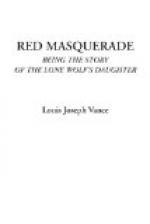Besides, in this uncertain life one never knows what the next hour will bring forth; whereas if one is in evening dress after six o’clock, one is armoured against every emergency.
At seven he sat down to the morbid sort of a meal one gets in London lodgings: a calm soup; a segment of vague fish smothered painlessly in a pale pink blanket of sauce; a cut from the joint, rare and lukewarm; potatoes boiled dead; sad sea-kale; nonconformist pudding; conservative biscuit, and radical cheese.
With the aid and abetment of a bottle of excellent Montrachet, however, one contrived to worry through.
Meanwhile, Lanyard inspected his recent purchase, which occupied a place of honour, propped up on the arms of the chair on his right.
It was seldom that Lanyard entertained a guest of such equivocal character. Wagging a reproving head—“My friend,” he harangued the canvas, “you are lucky to have been sold. Sorry I can’t say as much for myself.”
It was really too bad it wasn’t a bit better. It wasn’t often that one encountered so genuine a counterfeit. The hand of an artist had painted it, but never the hand of Corot. Everything Corot was accustomed to put into his painting was there, except himself. The abode had been prepared in all respects as the master would have had it, but his spirit had not entered into it, it remained without life.
Still, Lanyard concluded, surveying his prize through the illusioning fumes of his cigar, while the waiter cleared away, it wasn’t so bad after all, it wouldn’t be in the end a total loss. He could afford to cart the thing back to Paris with him and give it room in his private gallery; and some day, doubtless, some rich American would pay a handsome price for it on the strength of its having found place in the collection of Michael Lanyard, even though it lacked the cachet of his guarantee.
But what the devil had made it so precious to the soi-disant Prince Victor and his charming wife?
But for a single circumstance Lanyard would have been tempted to believe he had been craftily rooked by an accomplished chevalier d’industrie and his female confederate; but too much and too real passion had been betrayed in the auction room to countenance that suspicion.
No: he hadn’t been rigged; at least, not by design. Something more than its intrinsic value had rendered the canvas priceless in the esteem of those two, something had been at stake more than mere possession of what they might have believed to be a real Corot.
But what?
Perplexed, Lanyard took the picture in his hands—it was not too unwieldy, even in its frame—and examined it with nose so close to the painted surface that he seemed to be smelling it. Then he turned it over and scowled at its reverse. And shook a baffled head.
But when he tapped the face of the picture smartly with a finger-nail, he gave a slight start, passed a hand over it with the palm pressed flat, and suddenly assumed the humanly intelligent expression of a hunting-dog that has hit on a warm scent.




